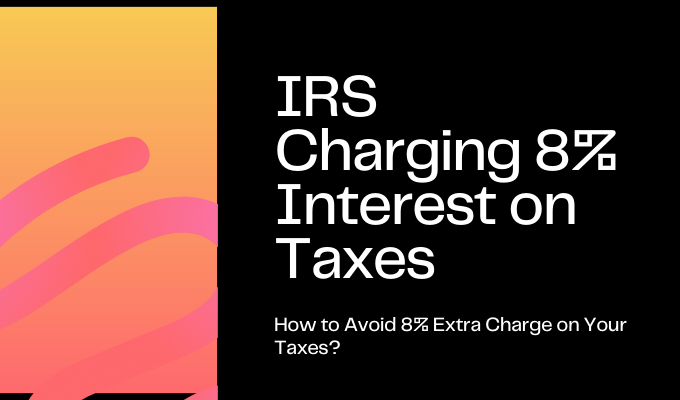Please read this post with us and find details on IRS Charging 8% Interest on Taxes: How to Avoid 8% Extra Charge on Your Taxes?
IRS Charging 8% Interest on Taxes
Interest will be assessed by the IRS on overdue or unpaid taxes, regardless of the reason. Until the outstanding amount is paid in whole, the revenue collection agency is obligated to impose interest. The time frame is always set to start on the original return due date and finish when the IRS receives payment.
From the original return due date to the payment date, interest is often assessed on any unpaid taxes. Every three months, the interest rate on overdue federal taxes is decided upon and announced. For taxes that are filed after the deadline or that are paid in full, the IRS currently charges 8% interest.
|
Important Links |
In this article, we are going to discuss in detail about IRS Charging 8% Interest on Taxes, its reasons and possible avoiding measures.
Understanding IRS Charging 8% Interest on Taxes
Interest is charged on both tax overpayments and underpayments. Every quarter, the IRS sets the interest rate, which is usually based on the federal short-term rate plus three percentage points for the majority of individual taxpayers.

For the first quarter (Q1) of 2024 and the fourth quarter (Q4) of 2023, the rates were 8% for individual underpayments and 10% for big business underpayments. Through the first three quarters of 2023, the IRS underpayment penalty was 7% for the majority of underpayments and 9% for underpayments by large corporations.
IRS Charging 8% Interest on Taxes Overview
| Post Title | IRS Charging 8% Interest on Taxes |
| Country | USA |
| Affected | Late tax fillers |
| Interest Rate | 8% and 10% |
| More Details | Discussed Here |
Reasons for IRS Charging 8% Interest on Taxes
There are various scenarios in which IRS can charge 8% interest on your taxes, we have discussed some below:
Failing to file: This refers to failing to submit your tax return by the deadline or, in the event that an extension to file is requested and granted, by the extended deadline.
Failure to pay: This refers to the state in which you do not pay all of the taxes indicated on your tax return by the original tax return’s deadline. Even if you have asked for an extension of time to submit your tax return, this does not extend the period of time to pay; you still need to pay your taxes by the original tax return due date. If the IRS issues a notice and demands payment and you don’t pay on time, they may also assess a failure to pay penalty.
Inadequate estimated tax payment: This refers to the situation when you make insufficient quarterly anticipated tax payments, or when withholding is necessary, to cover the full year’s taxes owed.
Bad Check: This refers to the condition when your bank refuses to accept your check or another form of payment, it’s called a bad check.
How to Avoid 8% Extra Charge on Your Taxes?
You can avoid the extra 8% interest charge from your taxes, using the steps discussed below:
File punctually: You risk paying significant fines if you fail to file your federal taxes or get an extension before April 18, 2023.
To lower taxable income, increase payments to retirement accounts: Since pre-tax contributions are normally made to traditional IRAs, 401(k)s, and 403(b)s, increasing either can lower taxable income and save taxes.
Make an investment into your health savings account (HSA): You might be able to use an HSA to help you save money for unexpected medical costs if your employer offers a high deductible health plan (HDHP).
|
Important Links |
Plan your payments for each month: Paying the entire tax amount is the greatest method to prevent interest from accruing. If that’s not feasible, however, you can arrange an installment agreement with the IRS to make payments on a monthly basis, and the IRS will waive the penalty for failing to pay. Less penalty translates into lower interest.
Additionally, if the pandemic or other circumstances affected you, the IRS might be able to waive or lessen some fines for reasonable cause—but only if you made an effort to abide by the tax code but were unable to do so because of events and circumstances outside of your control.
Conclusion
Before determining whether there is an abatement, the IRS will demand that penalties and interest be paid in full. The ” Interest meter” stops after you pay the bill, so there won’t be any more interest added to your account.
You may also seek abetment, but in order to do so, the taxpayer must demonstrate that the interest was partially caused by an Internal Revenue Service employee’s unjustified delay.
Write to the IRS office that issued the bill within the IRS-mandated time window to request an abatement of penalty. Make sure you give a succinct and clear description of the cause along with any supporting documents you may have.
Thanks for reading this post on IRS Charging 8% Interest on Taxes with our website, we hope that this information was useful.